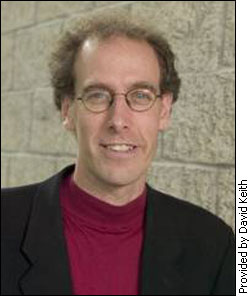|
Wind power encounters turbulence
By Esther Au
OTTAWA —
David Keith was out to solve
the world's problem of global warming. But what he discovered
about the effect of wind power on climate could possibly
hurt Canada's growing wind power industry.
Wind power is often viewed as an answer
to global warming because it doesn't produce carbon
dioxide emissions like other energy industries dependant
on burning fossil fuels.
Keith isn't worried about the intended
effect of wind power — after all, it is reducing
the amount of emissions going into the atmosphere, which
in turn reduces the human-caused climate change of global
warming. That was the purpose of building wind turbines
in the first place.
But he is worried about the unintended
effects of wind power. Results from his studies funded
by the United States National Science Foundation suggest
that large-scale use of wind power can alter local and
global climate — he's just not sure yet about
the scope of the changes and whether the changes are
good or bad.
"It's potentially a really
big deal in the energy world," he says.
How it all began
Keith is the Canada Research Chair of
Energy and the Environment and also a professor of economics
and chemical and petroleum engineering at the University
of Calgary.
 |
| Scientist David Keith,
Canada Research Chair of Energy and the Environment
|
He first became interested in climate
change during graduate school in the late 1980’s
at the Massachusetts Institute of Technology. Graduating
with a PhD in experimental physics, Keith focused his
research on atmospheric science and climate during his
time at Harvard University and Carnegie Mellon University.
In 2001, Keith attended a national meeting
on global warming that inspired him to begin research
on the effects of wind power on climate. Along with
several other researchers, he created a climate model
that produced a huge amount of wind power resulting
in climate changes of one degree centigrade.
"This is not happening just where
we put the turbines," Keith says, "You might
assume that the climatic effects of the wind turbines
are purely local where you put them and that it would
be the same everywhere … but no, it's not true;
it really is a large-scale global effect."
He says wind turbines change the circulation
of the wind in the atmosphere, altering the climate
by changing the amount of heat and moisture transported
by the winds.
Meanwhile, the actual climate changes
are difficult to calculate and are unknown at the moment.
So, the changes could be good or bad depending on the
person and the place. Keith says, "It's a value
judgment."
The main issue Keith is concerned about
is the ratio of benefits to impacts. He started the
research hoping the unintended impacts of wind power
would be 1,000 or even 10,000 times smaller than the
beneficial impacts of wind power.
| 'If it's really
true that there is significant climate impact, then
that would alter the extent that we would want to
use wind power' |
"We could publish a paper saying,
'This doesn't matter, forget about it, we checked it,
nobody needs to bother thinking about it again.' That
wasn't true," Keith says. "In fact, the intended
and unintended consequences are of similar magnitude."
He says this means the impact of wind
power on climate is big enough that more work needs
to be done and people should take the research seriously
because of its implications. "If it's really true
that there is significant climate impact, then that
would alter the extent that we would want to use wind
power," he says.
Challenging the industry
While his work sounds like bad
news for the wind power industry, Keith maintains that
at the rate at which humans use energy, there isn't
a perfect technology that doesn't have a significant
environmental impact. "Some things are clearly
much worse than others," Keith says. "Uncontrolled
coal combusters are clearly a much worse technology
than, say, wind power is in terms of environmental impact."
He says it's difficult to get people
to think about the effects of wind power on climate,
while doing minimum damage to the wind power industry.
When he started his research on the climatic effects
of wind power, no one had done similar studies. After
he published his paper last year in the Proceedings
of the National Academy of Science, some people accused
him of being "faulty," "reckless,"
and "lighting a fire in the barn."
"We've had attacks from some people
in the environmental community who think we're out to
get them. But I'm generally in support of wind power,"
Keith says.
He's continuing his research with high-resolution
climate models because he wants to determine the exact
ratio of effects. “It'll take 10 years to settle
such a big issue," Keith says.
As for now, if a farmer asks how his
crops and soil will be affected by wind power, Keith
can only say there probably are local and global effects
of wind power that do matter.
Keith says, "It's painfully little
to say, but it's something."
|